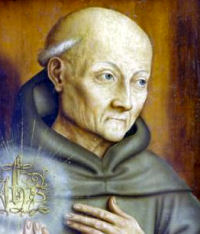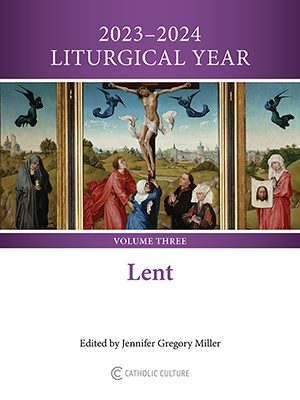Easter: May 20th
Thursday of the Seventh Week of Easter; Optional Memorial of St. Bernardine of Siena, priest
Other Commemorations: St. Lydia (RM)
» Enjoy our Liturgical Seasons series of e-books!
Born in 1380, St. Bernardine of Siena left the world at an early age in order to lead a hermit's life. When he was twenty-two, he entered the Franciscan Order, one of whose glories he is. Having been made General of the Order, he resigned this charge in order to devote himself to preaching. He preached the name of Jesus with such love that it wrought the transformation of many souls. He was instrumental in effecting many conversions. He died at Aquilea, in the midst of his missionary labors, on May 20, 1444, and was canonized six years later.
St. Bernadine
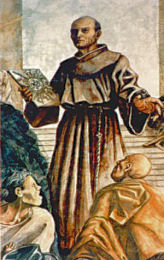 Bernardine was born in Carrara, Italy, in 1380. Even as a boy he nursed the sick during a time of pestilence in Siena. During a severe illness he decided upon entering a monastery and becoming a Franciscan. His superiors assigned him the task of preaching, and he submitted humbly despite a throat affliction. God heard his petition, and the ailment was miraculously cured.
Bernardine was born in Carrara, Italy, in 1380. Even as a boy he nursed the sick during a time of pestilence in Siena. During a severe illness he decided upon entering a monastery and becoming a Franciscan. His superiors assigned him the task of preaching, and he submitted humbly despite a throat affliction. God heard his petition, and the ailment was miraculously cured.
A powerful and eloquent preacher (Pius II called him "a second Paul") and a zealous apostle, Bernardine traveled the length and breadth of Italy, inculcating love and reverence toward the holy Name of Jesus. He exerted a powerful influence upon his contemporaries, inaugurating a genuine reformation within the Church. Seldom has a saint had so many and so distinguished followers (including St. John Capistran). Upon entering a city, Bernardine had a standard carried before him upon which was the holy Name of Jesus (IHS) encircled with twelve golden rays and surmounted by a cross.
When he preached, this symbol was placed alongside the pulpit; or he would hold in his hand a tablet bearing the divine monogram in letters large enough to be visible to the entire audience. It was also his zealous appeals that induced many priests to put the Name of Jesus on the altars and walls of their churches, or to have little cards with the inscription distributed among the people. At his instigation the public buildings in many cities of Italy were adorned with the monogram suitably enlarged, as can still be seen in Siena. At the Council of Florence St. Bernardine labored strenuously to end the schism (1439).
—Excerpted from The Church's Year of Grace, Pius Parsch.
Symbols and Representation: IHS within a circle of golden rays; open book; pile of vanities in flames;
Often portrayed as: A Franciscan holding a sun upon which the Name of Jesus is inscribed.
Patronage: advertisers; advertising; against hoarseness; communications; compulsive or uncontrolled gambling; gambling addicts; lungs; public relations; chest, respiratory, or lung problems; Aquila, Italy; diocese of San Bernardino, California; Italy;
Highlights and Things to Do:
- Our saint's glowing love for the holy Name of Jesus fills us with admiration. Keep this blessed Name on your lips, and more so in your heart. It is a Name that always arouses love for Christ. Never use it lightly or irreverently.
- From the Catholic Culture Library: St. Bernardino Fostered Holy Name Devotion.
- Read more about St. Bernadine of Siena:
- His tomb is located in the Basilica of San Bernardino in L'Aquila, Italy.
- Christian Iconography has some beautiful images of St. Bernardine.
- The IHS Christogram is from St. Bernardine.
St. Lydia
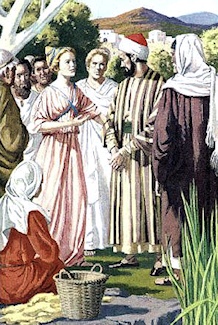 Saint Lydia was born during the first century in Thyatira, a town famous for its dye works in Asia Minor, famous for its dye works, (hence, her name which means purple seller). She was a seller of purple dye and was St. Paul's first convert at Philippi. The following is from the Acts of the Apostles:
Saint Lydia was born during the first century in Thyatira, a town famous for its dye works in Asia Minor, famous for its dye works, (hence, her name which means purple seller). She was a seller of purple dye and was St. Paul's first convert at Philippi. The following is from the Acts of the Apostles:
And a certain woman named Lydia, a seller of purple, of the city of Thyatira, one that worshipped God, did hear: whose heart the Lord opened to attend to those things which were said by Paul. And when she was baptized, and her household, she besought us, saying: If you have judged me to be faithful to the Lord, come into my house, and abide there. And she constrained us (Acts 16:14-15).
She was baptized with her household. Thereafter, Paul made his home with her while in Philippi.
Lydia was a woman of hospitality, a woman of faith. As a successful businesswoman, she most likely had a home spacious enough to welcome guests and to use her home as a Christian center, where others would gather for the Holy Mass and prayer. After Paul and Silas were released from prison, they went immediately to Lydia’s house to see and encourage the believers gathered there. Lydia served the Lord through her gift of hospitality by welcoming others into her home.
—Excerpted from Catholic Fire
Highlights and Things to Do:
- Read more:
- Watch St. Lydia—The Woman of Purple.
Mary, Queen of Apostles
Mary is Queen of Apostles because she was chosen to be the Mother of Jesus Christ and to give him to the world; she was made the apostles' Mother and our own by our Savior on the cross. She was with the apostles while awaiting the descent of the Holy Spirit, obtaining for them the abundance of supernatural graces they received on Pentecost. The most holy Virgin was and always will be the wellspring for every apostolate.
She exercised a universal apostolate, one so vast that it embraced all others. The apostolate of prayer, the apostolate of good example, the apostolate of suffering—Mary fulfilled them all. Other people have practiced certain teachings of the Gospel; Mary lived them all. Mary is full of grace, and we draw from her abundance.
Mary attracts the zealous to the various apostolates, then protects and defends all these works. She sheds on each the warmth of her love and the light of her countenance. She presented Jesus in a manner unparalleled throughout the ages. Her apostolate is of the highest degree--never to be equaled, much less surpassed.
Mary gave Jesus to the world and with Jesus came every other blessing. Thus, because of Mary we have the Church: "Mary is the Mother of the Church not only because she is the Mother of Christ and his most intimate associate in 'the new economy when the Son of God took a human nature from her, that he might in the mysteries of his flesh free man from sin,' but also because 'she shines forth to the whole community of the elect as a model of the virtues' (Lumen Gentium. 55, 65). 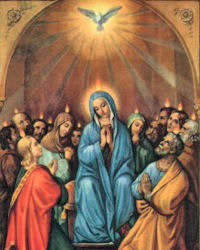 She now continues to fulfill from heaven her maternal function as the cooperator in the birth and development of the divine life in the individual souls of the redeemed" (The Great Sign, by Paul VI). What do we have of value that we have not received through Mary? It is God's will that every blessing should come to us through her.
She now continues to fulfill from heaven her maternal function as the cooperator in the birth and development of the divine life in the individual souls of the redeemed" (The Great Sign, by Paul VI). What do we have of value that we have not received through Mary? It is God's will that every blessing should come to us through her.
Highlights and Things to Do:
- Say Novena to Queen of Apostles
- Read Pentecost with Mary, Queen of Apostles on Catholic Culture





